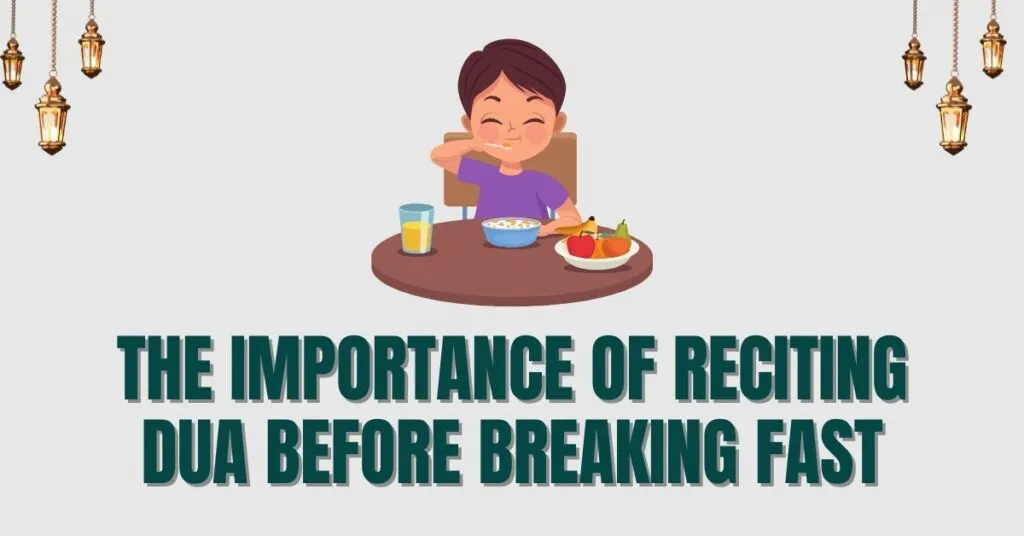Fasting isn’t just about staying hungry or thirsty — it’s a journey of the soul. Every believer who fasts experiences discipline, self-control, and closeness to Allah. It’s a time when hearts soften, prayers deepen, and every small act done for Allah’s sake is multiplied in reward.
Why Fasting Holds a Special Place in Islam
Fasting (Sawm) is one of the five pillars of Islam. It teaches patience, gratitude, and empathy for those who struggle. But beyond that, it strengthens your connection with Allah and purifies your heart from worldly distractions.
The Spiritual Connection Between Fasting and Dua
There’s something truly special about making dua for breaking fast. It’s not just a ritual — it’s a moment when your heart speaks directly to your Creator. The Prophet Muhammad (ﷺ) told us that the supplication of a fasting person is not rejected at the time of breaking the fast. That means your dua at iftar is powerful — so make it count.
What is the Dua for Breaking Fast?
The Dua for breaking fast is a beautiful Sunnah supplication recited at iftar, expressing gratitude and devotion to Allah for His blessings.
The Arabic Text of the Dua for Breaking Fast
اللّهُمَّ إِنِّي لَكَ صُمْتُ وَبِكَ آمَنْتُ وَعَلَيْكَ تَوَكَّلْتُ وَعَلَى رِزْقِكَ أَفْطَرْتُ
English Transliteration:
Allahumma inni laka sumtu, wa bika aamantu, wa ‘alayka tawakkaltu, wa ‘ala rizqika-aftartu.
English Translation:
O Allah! I fasted for You, and I believe in You, and I put my trust in You, and with Your sustenance, I break my fast.
This short yet powerful dua captures the essence of faith and gratitude. It acknowledges that every moment of patience and every bite at iftar is only by Allah’s mercy.
The Importance of Reciting Dua Before Breaking Fast

Reciting the dua before breaking fast brings immense blessings, follows the Sunnah, and ensures your supplication is accepted at this sacred moment.
Following the Sunnah of Prophet Muhammad (ﷺ)
The Prophet (ﷺ) always began his iftar by reciting this dua and breaking his fast with dates or water. By doing the same, we not only earn reward but also revive his beautiful Sunnah in our lives.
The Blessings and Rewards of Making Dua at Iftar
The time before iftar is one of the most blessed moments to make dua. Allah listens attentively to His fasting servant. Whether it’s forgiveness, guidance, or success — your dua holds power during this sacred moment.
The Right Time to Recite the Dua for Breaking Fast
The right time to recite the dua for breaking fast is just before eating, at the moment of iftar, when duas are most likely to be accepted.
When Exactly Should You Say the Dua?
You should recite the dua for breaking fast right before you eat — after confirming the Maghrib time. It’s Sunnah to say it while holding your date or glass of water before taking the first bite.
The Moment of Acceptance – A Special Time for Supplication
That brief instant before you eat is when your heart is softest, your intentions are purest, and your dua is most likely to be accepted. Don’t rush it — take a deep breath, feel gratitude, and call upon Allah sincerely.
Common Mistakes People Make While Breaking the Fast
Many people make mistakes while breaking the fast, such as forgetting the dua, rushing the iftar, or getting distracted during this blessed moment.
Forgetting the Dua or Saying It Too Late
In the excitement of iftar, it’s common to forget the dua. But remember — these few seconds hold immense reward. Make it a habit to recite it before lifting your spoon or taking your first sip.
Getting Distracted at Iftar Time
Phones, TV, and social chatter can steal this precious spiritual moment. Try to keep the atmosphere calm, with everyone focused on dua and remembrance.
The Sunnah Way to Break the Fast
The Sunnah way to break the fast is by eating dates or drinking water first, followed by reciting the dua with gratitude and humility.
Breaking Fast with Dates and Water
The Prophet (ﷺ) used to break his fast with fresh dates, and if none were available, with water. It’s simple, pure, and refreshing. Modern science even confirms that dates instantly restore energy and hydration.
Showing Gratitude and Humility at Iftar
Remember to say “Alhamdulillah” after eating. Gratitude is the heart of worship, and it makes your fasting complete.
Powerful Duas to Make at the Time of Iftar
The time of iftar is a blessed moment to make powerful duas, seeking Allah’s mercy, forgiveness, and blessings for yourself and your loved ones.
Asking for Forgiveness and Mercy
The Prophet (ﷺ) said: “Whoever fasts in Ramadan out of sincere faith and seeking reward, his past sins will be forgiven.”
This is the perfect moment to ask for forgiveness — sincerely, humbly, and wholeheartedly.
Praying for Family, Health, and Sustenance
Use this moment to make heartfelt dua for your parents, children, and loved ones. Ask Allah to bless your home with peace, rizq, and guidance.
Learn More About Duas and Quran with Al-Huda Quran Academy
Explore and master authentic duas and Quran recitation with expert tutors at Al-Huda Quran Academy through interactive online classes.
Why Choose Al-Huda Quran Academy for Online Islamic Learning
At Al-Huda Quran Academy, we make learning Islam easy and interactive for all ages. From Quran recitation and Tajweed to daily duas and Hadith lessons, our certified male and female tutors guide you step-by-step.
Learn online from anywhere, at your own pace, and strengthen your bond with the Quran and Sunnah.
If you want to master daily duas — including the dua for breaking fast — join Al-Huda Quran Academy today and start your journey of spiritual growth.
Frequently Asked Questions (FAQs)
The dua is: Allahumma inni laka sumtu, wa bika aamantu, wa ‘alayka tawakkaltu, wa ‘ala rizqika-aftartu.
Yes, you can. Allah understands all languages and values sincerity over pronunciation.
It’s Sunnah but not obligatory. If dates are unavailable, water or any halal food is fine.
Simply say it as soon as you remember. Allah is Merciful and knows your intention.
Absolutely! Encourage them to learn it early — it’s a beautiful habit that strengthens their connection with Allah.
Conclusion
The dua for breaking fast isn’t just words — it’s a heartfelt expression of love, gratitude, and surrender to Allah. When you recite it with sincerity, you’re doing more than ending hunger; you’re renewing your faith.
So next time you sit down for iftar, pause for a moment, whisper this beautiful dua, and feel the peace that comes with obeying the Sunnah.

